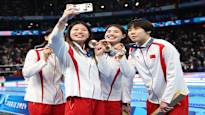The public showed restraint in the Chinese swimmers’ doping saga at the opening of the Olympic swimming. Over the years, Paris has also seen another kind of behavior, writes Atte Husu.
Atte Husu
PARIS. When the Paris Olympics are looking for a sports arena with the highest decibel number from the audience’s excitement, the swimming center La Defense is a strong candidate for the gold standard in the category. It hit the table with its own performance immediately after shaking hands – and without the home crowd’s favorite Leon Marchand.
When the 17,000-seat arena is sold out every day of swimming, both in the morning qualifiers and in the evening finals, the cabin is guaranteed.
On the opening day, however, there was quite a contrast when Chinese swimmers were announced on stage. The doping saga concerning part of the Chinese swimmers, which the swimming and anti-doping community has been discussing for months, is strongly present at these Olympics.
On Saturday morning, the reactions of the public did not come out strongly yet, because in the qualifying races, swimmers are brought and removed from the pool in a conveyor belt style without any kind of introductions.
In the evening, in the stands, the spirit of the game became clear right away during the presentation of the second semi-final of the first event, the women’s 100-meter butterfly. A deafening cheer rang out in the arena when the US Torri Huske was announced. About ten seconds later the Chinese Zhang Yufei stepped in as if into another reality.
A large part of the La Defense stand sat quietly and did not applaud. Qin Haiyang experienced the same in the semi-finals of the men’s 100m breaststroke and Liwei Fei In the final of the 400 meter freestyle. The trio is among the 23 Chinese who gave a doping sample containing trimetazidine in 2021 but escaped unpunished.
On Thursday, US and Australian swimming stars vented their disappointment with the anti-doping system. The reigning Olympic champion in the 200m breaststroke Zac Stubblety-Cook didn’t rule out the idea of being left out of the podium if he had to share it with Qin Haiyang.
The statements created an expectant mood for Saturday and raised the question of how the La Defense crowd would react to the situation. It was made even more sensitive by the fact that the Parisian sports audience is not the most polite and understanding if it decides to target someone.
In 2003, an American tennis star Serena Williams broke down in tears on Center Court at Roland Garros as the Parisian crowd booed and booed him numerous times during his semi-final match against the Belgian Justine Henin against.
If someone had painted a picture for Williams after the match that she would carry the Olympic torch in front of Parisians in the future, Williams would surely have laughed at the scenario.
Although 21 years later, Williams carried the torch at Friday’s opening ceremony, there is still another side to his memory that is guaranteed to be found in the French public.
The Chinese swimmers got a different treatment on Saturday. And that’s fine.
At this point, it’s good to underline that the alleged evidence collected by the Chinese security authorities about the country’s swimmers crowding is devoid of any credible basis. However, the party that lost the most in the saga is the anti-doping system, which swallowed the fabrications on the default basis of the Chinese security authority and has since dug itself a deeper hole every day.
If the stage at La Defense had been announced from the WADA leadership of the World Anti-Doping Agency, the reception might have been less restrained than what the Chinese got from the audience.
The public’s silent protest was a much more elegant solution than whistling and booing. Hats off to the performance.
A little thorn
Judging from the press stand, the presence of the Chinese did not arouse any emotional reactions among the athletes during the competition.
After the competitions ended, however, the tension was perfectly visible in the prize distribution of the women’s 4×100 meter freestyle relay, where Australia and the United States bagged the brightest medals.
When the teams were about to take a classic photo together on the highest podium, the Aussies, to put it nicely, didn’t start compacting so that all the four Chinese who took the bronze could fit in a row on the same podium. As a result, the two Chinese initially had to maneuver on the edge of the podium, having to take support with one leg from the lower bronze ball, until the two decided to seek additional space at the front of the podium.
